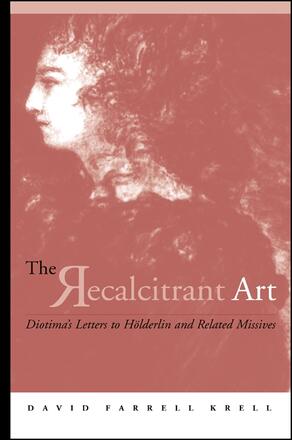
The Recalcitrant Art
Diotima's Letters to Hölderlin and Related Missives Edited and translated by Douglas F. Kenney and Sabine Menner-Bettscheid
Alternative formats available from:
Combines the techniques of fiction and nonfiction in order to tell the story of the love between Susette Gontard ("Diotima") and the poet Friedrich Holderlin.
Description
In this entirely unique approach to the life of Friedrich Hölderlin, The Recalcitrant Art combines the techniques of fiction and nonfiction as it examines the love between the poet and Susette Gontard ("Diotima").
On the left-hand or verso pages of the book appear Susette Gontard's letters, presented here in English translation for the first time, with an introduction and afterword by Douglas F. Kenney. On the right-hand or recto pages appear Sabine Menner-Bettscheid's scholarly responses to Kenney and fictional responses to Susette. Menner-Bettscheid gives life to an entire series of voices: Hölderlin's pious mother, Susette's calculating husband, Jacob, the Gontard's oldest child, Henry, the popular novelist Sophie LaRoche, and the Greek gardener and rabbit-keeper at the Gontard's summer home in Frankfurt all come to be heard. Douglas F. Kenney, by contrast, sticks to historical documentation and literary analysis.
David Farrell Krell is Professor of Philosophy at DePaul University. He has written many books, including the SUNY Press titles Archeticture: Ecstasies of Space, Time, and the Human Body; Nietzsche: A Novel; and Son of Spirit: A Novel.
Reviews
"The centerpiece of this unique volume consists of the 17 known letters written by Gontard to Hölderlin … [s]ensitively translated here for the first time into English ... As the volume progresses … one comes to appreciate the insight and stimulation produced by the creative tension between the two editors." — CHOICE
"This is a highly original piece of work. At once novel, literary criticism, historical meditation, literary history and an ironization of all of the above, it shows the author's considerable erudition in an impressive number of fields alongside a wonderful gift for writing in the voices of others." — Carol Jacobs, author of In the Language of Walter Benjamin
"The book is full of unexpected flashes of recognition that really make the reader think about the key issues at stake: love, secrets, commitments, passion, imagination, anxiety, reading, editing, scholarship, settling accounts, madness, identity, influence, intimacy, necromancy, narcissism, self, and other … It provides intrigue, varying degrees and aspects of intensity, unexpected humor, nuance, revelation, and ultimately the recalcitrance of the readerly-scholarly desire to know the secrets of lovers, the secrets of Love." — Jonathan Steinwand, Concordia College